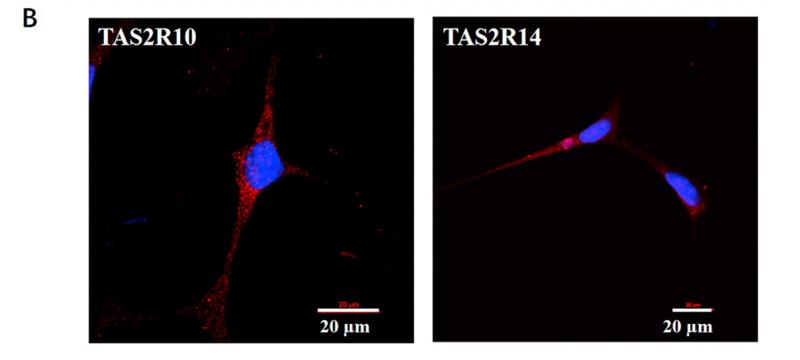TAS2R10 Antibody - #DF5157
| 製品: | TAS2R10 Antibody |
| カタログ: | DF5157 |
| タンパク質の説明: | Rabbit polyclonal antibody to TAS2R10 |
| アプリケーション: | WB IF/ICC |
| Cited expt.: | IF/ICC |
| 反応性: | Human |
| 分子量: | 35 KD; 35kD(Calculated). |
| ユニプロット: | Q9NYW0 |
| RRID: | AB_2837347 |
製品説明
*The optimal dilutions should be determined by the end user. For optimal experimental results, antibody reuse is not recommended.
*Tips:
WB: For western blot detection of denatured protein samples. IHC: For immunohistochemical detection of paraffin sections (IHC-p) or frozen sections (IHC-f) of tissue samples. IF/ICC: For immunofluorescence detection of cell samples. ELISA(peptide): For ELISA detection of antigenic peptide.
引用形式: Affinity Biosciences Cat# DF5157, RRID:AB_2837347.
折りたたみ/展開
MGC126811; MGC126813; T2R10; T2R10_HUMAN; TAS2R10; Taste receptor family B member 2; Taste receptor type 2 member 10; Taste receptor, family B, member 2; Taste receptor, type 2, member 10; TRB2;
免疫原
A synthesized peptide derived from human TAS2R10, corresponding to a region within the internal amino acids.
Expressed in subsets of taste receptor cells of the tongue and palate epithelium and exclusively in gustducin-positive cells.
- Q9NYW0 T2R10_HUMAN:
- Protein BLAST With
- NCBI/
- ExPASy/
- Uniprot
MLRVVEGIFIFVVVSESVFGVLGNGFIGLVNCIDCAKNKLSTIGFILTGLAISRIFLIWIIITDGFIQIFSPNIYASGNLIEYISYFWVIGNQSSMWFATSLSIFYFLKIANFSNYIFLWLKSRTNMVLPFMIVFLLISSLLNFAYIAKILNDYKTKNDTVWDLNMYKSEYFIKQILLNLGVIFFFTLSLITCIFLIISLWRHNRQMQSNVTGLRDSNTEAHVKAMKVLISFIILFILYFIGMAIEISCFTVRENKLLLMFGMTTTAIYPWGHSFILILGNSKLKQASLRVLQQLKCCEKRKNLRVT
研究背景
Gustducin-coupled strychnine receptor implicated in the perception of bitter compounds in the oral cavity and the gastrointestinal tract. Signals through PLCB2 and the calcium-regulated cation channel TRPM5.
Membrane>Multi-pass membrane protein.
Expressed in subsets of taste receptor cells of the tongue and palate epithelium and exclusively in gustducin-positive cells.
Belongs to the G-protein coupled receptor T2R family.
研究領域
· Organismal Systems > Sensory system > Taste transduction.
参考文献
Application: IF/ICC Species: Mouse Sample: ASM cells
Restrictive clause
Affinity Biosciences tests all products strictly. Citations are provided as a resource for additional applications that have not been validated by Affinity Biosciences. Please choose the appropriate format for each application and consult Materials and Methods sections for additional details about the use of any product in these publications.
For Research Use Only.
Not for use in diagnostic or therapeutic procedures. Not for resale. Not for distribution without written consent. Affinity Biosciences will not be held responsible for patent infringement or other violations that may occur with the use of our products. Affinity Biosciences, Affinity Biosciences Logo and all other trademarks are the property of Affinity Biosciences LTD.
